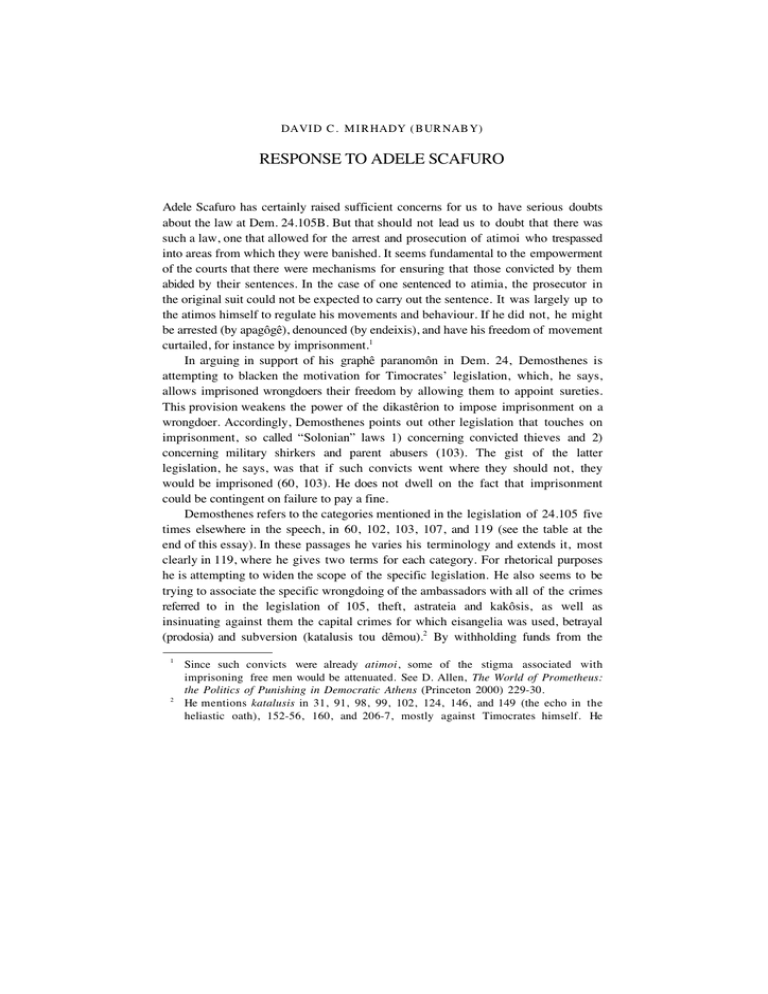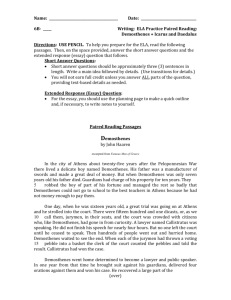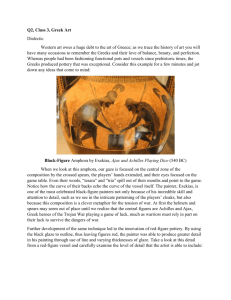RESPONSE TO ADELE SCAFURO
advertisement

DAVI D C . M I R HADY ( B UR NAB Y) RESPONSE TO ADELE SCAFURO Adele Scafuro has certainly raised sufficient concerns for us to have serious doubts about the law at Dem. 24.105B. But that should not lead us to doubt that there was such a law, one that allowed for the arrest and prosecution of atimoi who trespassed into areas from which they were banished. It seems fundamental to the empowerment of the courts that there were mechanisms for ensuring that those convicted by them abided by their sentences. In the case of one sentenced to atimia, the prosecutor in the original suit could not be expected to carry out the sentence. It was largely up to the atimos himself to regulate his movements and behaviour. If he did not, he might be arrested (by apagôgê), denounced (by endeixis), and have his freedom of movement curtailed, for instance by imprisonment.1 In arguing in support of his graphê paranomôn in Dem. 24, Demosthenes is attempting to blacken the motivation for Timocrates’ legislation, which, he says, allows imprisoned wrongdoers their freedom by allowing them to appoint sureties. This provision weakens the power of the dikastêrion to impose imprisonment on a wrongdoer. Accordingly, Demosthenes points out other legislation that touches on imprisonment, so called “Solonian” laws 1) concerning convicted thieves and 2) concerning military shirkers and parent abusers (103). The gist of the latter legislation, he says, was that if such convicts went where they should not, they would be imprisoned (60, 103). He does not dwell on the fact that imprisonment could be contingent on failure to pay a fine. Demosthenes refers to the categories mentioned in the legislation of 24.105 five times elsewhere in the speech, in 60, 102, 103, 107, and 119 (see the table at the end of this essay). In these passages he varies his terminology and extends it, most clearly in 119, where he gives two terms for each category. For rhetorical purposes he is attempting to widen the scope of the specific legislation. He also seems to be trying to associate the specific wrongdoing of the ambassadors with all of the crimes referred to in the legislation of 105, theft, astrateia and kakôsis, as well as insinuating against them the capital crimes for which eisangelia was used, betrayal (prodosia) and subversion (katalusis tou dêmou).2 By withholding funds from the 1 2 Since such convicts were already atimoi, some of the stigma associated with imprisoning free men would be attenuated. See D. Allen, The World of Prometheus: the Politics of Punishing in Democratic Athens (Princeton 2000) 229-30. He mentions katalusis in 31, 91, 98, 99, 102, 124, 146, and 149 (the echo in the heliastic oath), 152-56, 160, and 206-7, mostly against Timocrates himself. He 72 David C. Mirhady polis they are thieves (and betrayers), by depriving the military forces of resources they are military shirkers, and by disturbing the “household management” of the city they are abusing the city as parent (and subverting its authority). When viewed in this way, the three categories appear to be theft, shirking, and abuse of parents. There is no separate category for homicide. The three categories are arranged on the table. In the first row are references to Timocrates’ legislation, which, Demosthenes claims, not only makes the prostimata of the courts invalid in the case of the ambassadors (102A), buts also subverts the punishments of all valid laws (102B). In the second row are his references to theft, which, because of the ambassadors, Demosthenes associates with “betraying” something of the commons (60) and with doing injustice to the commons (102A). The connection between theft and prodosia seems at first glance to be a stretch, but if so then it is Demosthenes’ stretch: he describes the ambassadors as having betrayed, as having thieved, and even as having plundered money (kl°cantaw mçllon d' èrpãsantaw tå xrÆmata 60); elsewhere klopê and prodosia are clearly linked (kl°pthw ∑n, ka‹ prodos¤aw g ' èloÁw 127). Demosthenes also associates thieves with kakourgoi (102B and 107) and with temple robbers (119).3 Hansen has shown that thieves are the wrongdoers most often identified as kakourgoi.4 In the third row, Demosthenes deals quite straightforwardly with astrateia (astrateutoi), using the same terms in 102, 103, 107 and 119. The ambassadors’ actions in depriving the polis of funds have also hurt its military forces, however, so that the comment in that regard in 60 is probably an attempt to associate the ambassadors both with theft and with astrateia. In the bottom row, Demosthenes associates the mistreatment of parents with parricides and homicides. He slides from kakountes (60, 103) to patraloiai (102, 119) and on to androphonoi (119), but they must all refer to the same category. Sections 102 and 119 lead us to make this connection, since neither has the term kakôsis, but within the same framework they substitute patraloiai. Sections 103 and 107, which are nearest the quotation of the law in 105, mention only abuse. The term patraloias originally refers simply to one who strikes his father (Lys. 10.8, 11.4; Suda A 1417) and is thus an abuser. But it is also taken to mean “parricide”, so it is a good 3 4 mentions prodosia in 124, 144, and 146. In 146 he seems to suggest that Timocrates was arguing that imprisonment was only appropriate for these crimes. The thieving references are extended in 112 and 204-5. See M. H. Hansen, Apagoge, Endeixis and Ephegesis against Kakourgoi, Atimoi and Pheugontes (Odense 1976) 45 n. 33; Ant. 5.9; Dem. 23.26; Xen., Hell. 1.7.22. In 24, Demosthenes also uses the term kakourgos more widely in reference t o Timocrates (65, 86, 94, 106, 157, 204, 216). Response to Adele Scafuro 73 term for making this semantic slide. Those with unclean hands in 24.60 are then also the parent abusers.5 Unclean hands are certainly those of a murderer (Ant. 5.11). In this speech, however, parent abusers are quite clearly identified with parricides and androphonoi, so it should not be surprising that they are also described, in 60, as having unclean hands. Dem. 57.55 suggests, however, that the idea of enjoying citizen rights “cleanly” (kayar«w) could also be used even where there was no suggestion of avoidance of parricide or homicide. Indeed, uncleanness might derive only from abuse of parents. In the Clouds, for instance, Aristophanes makes a quick slide from “unclean” to patraloias (Œ miar¢ ka‹ patralo›a 1327), when in fact only the striking of a father and not homicide is meant.6 In a passage especially relevant to this law, Andocides 1.74 says that all those convicted of astrateia and kakôsis are atimoi (and so in a sense unclean) with respect to their bodies (êtimoi ∑san t å s≈mata),7 though they keep their property. All these passages suggest that Demosthenes might slide easily from uncleanness (of the body or of citizen rights) to unclean hands (viz. homicide) inasmuch as hands are a part of the body. His slide from kakôsis tôn goneôn to androphonia sets the foundation for this. Demosthenes also seems to associate the subversion of the running of the polis “household” in 102 (tØn dioflkhsin katalÊei) with kakôsis, and Aeschines 1.28 shows that parental abuse can involve not providing housing (mØ par°xvn o‡khsin).8 The motif of the city as parent who is not to be abused has a parallel in Dem. 10.40-41. The association of 24.105 with homicide law has been due to the phrase proeirhm°non aÈt“ t«n nÒmvn e‡rgesyai, which occurs in much the same wording in Antiphon 6.40 (proeirhm°non moi e‡rgesyai t«n nom¤mvn). This passage has caused the greatest difficulty for interpreters, including Adele Scafuro, because of its apparent inconsistency with 23.80. The easiest solution might be simply to delete the passage an as insertion by a scholar who saw the phrasing referring to unclean hands, to patraloia, and to androphonoi (in 60, 102, and 119): he may have assumed that Demosthenes was referring to homicide law rather than to laws against the abuse of parents, which Demosthenes was actually only extending for rhetorical purposes to parricide. The scholar would thus have “improved” the text a step further by adding a phrase that would explain that the convicts were actually 5 6 7 8 In 24.60, Demosthenes is using asyndeton, so it is impossible to distinguish a new category from an old one re-expressed in apposition. See also the scene with the Patraloias in Birds 1337-72 and the association of patraloiai with mud in Frogs 274-5. The prostitutes of Aeschin. 1.28 are seemingly also described as unclean. Cf. Aeschin. 1.188 oÈk Ãn §k t«n nÒmvn kayarÚw tÚ s«ma. In 2.148 Aeschines mentions that Demosthenes was prosecuted for desertion (lipotaxiou) but then joined with another in killing his prosecutor before entering the agora although “being not clean”. See the essay of D. M. MacDowell in this collection. 74 David C. Mirhady prohibited by proclamation (prorrhêsis). As Adele Scafuro suggests, both homicide procedures in general and this passage become much simpler if the phase is rejected. However, it may be possible to save it. Sections 60 and 103 both refer to such people entering the agora, where they are forbidden, though there is no mention of a proclamation (prorrhêsis). Andocides 1.76 says, however, that there was a “requirement” (prostaxis) that such atimoi refrain from entering the agora (to›w d' efiw tØn égorån mØ efisi°nai prÒstajiw ∑n), and in 179 he mentions with which officials copies of such a prostaxis were recorded. Lysias 2.1 makes clear that a prostaxis could be a formal act of the polis.9 This prostaxis may also have been proclaimed as a prorrhêsis (we have insufficient evidence to say), in which case we would have to understand a prorrhêsis as used not exclusively for cases of homicide. The clause proeirhm°non aÈt“ t«n nÒmvn e‡rgesyai would, then, also not refer exclusively to homicide, which seems a plausible way of reading, and preserving, the text. Most of the phraseology and idioms of 105 are consistent with Athenian law. The passages that serve to confirm it are generally in Demosthenes 24 itself (and appear in the table), but there are others, like Ath. Pol. 63.3, that lend outside support. The phrase efisi∆n ˜poi mØ xrÆ, for instance, has many parallels in prohibitions against entering holy places; they also use the participle efisi∆n.10 There seems to be no support for the word xrÆ in the phrase ˜poi mØ xrÆ. The word seems to be rather ¶jesti as in the parallel text in Ath. Pol. 63.3.11 This difference, however, is not significant. The procedural parts of 105 also seem consistent both with 24.63, which is purportedly legislation introduced earlier by Timocrates himself, and with Ath. Pol. 63.3, which describes actions taken against a dicast accused of being atimos (cf. 24.146, below): 9 10 11 There may be an echo of the term in 24.78: îr' oÔn t“ doke› sumf°rein tª pÒlei toioËtow nÒmow ˘w dikasthr¤ou gn≈sevw aÈtÚw kuri≈terow ¶stai, ka‹ tåw ÍpÚ t«n ÙmvmokÒtvn gn≈seiw to›w énvmÒtoiw prostãjei lÊein; See also 24.79 éll' oÈd' ì d¤kai' …r¤sat' aÈtÚw §n t“ nÒmƒ ka‹ pros°taje to›w »flhkÒsin, 24.85, and 112. And. 1.132 ka‹ efisi∆n efiw tÚ ÉEleus¤nion ka‹ yÊvn, Àsper §mautÚn êjion nom¤zv e‰nai. ... nËn d¢ éseb« ka‹ édik« efisi∆n efiw tå flerã. Cf. Ant. 6.45; Tetr. 2.2.11; Dem. 22.36; Lys. 6.33. See also Dem. 23.51-52, Pollux 8.50. 75 Response to Adele Scafuro AP 63.3 atimoi et al. acting as dicasts Dem. 24.63 Dem. 24.105B dikãzein d' ¶jestin to›w Íp¢r l' ¶th gegonÒsin, ˜soi aÈt«n mØ Ùfe¤lousin t“ dhmos¤ƒ µ êtimo¤ efisin. §ån d° tiw dikãz˙ oÂw mØ ¶jestin, §nde¤knutai ka‹ efiw tÚ dikastÆrion efisãgetai: §ån d' èl“, prostim«sin aÈt“ ofl dikasta‹ ˜ ti ín dokª êjiow e‰nai paye›n µ épote›sai. §ån d¢ érgur¤ou timhyª, de› aÈtÚn ded°syai, ßvw ín §kte¤s˙ ... kathgore›n d' ÉAyhna¤vn tÚn boulÒmenon oÂw ¶jestin. §ån d° tiw épaxyª, ... efisi∆n ˜poi mØ xrÆ, dhsãntvn aÈtÚn ofl ßndeka (cf. Lys. 10.10) ka‹ efisagÒntvn efiw tØn ≤lia¤an, kathgore¤tv d¢ ı boulÒmenow oÂw ¶jestin. §ån d' èl“, timãtv ≤ ≤lia¤a per‹ aÈtoË ˜ ti ín dokª êjiow e‰nai paye›n µ épote›sai. §ån d' érgur¤ou timhyª, ded°syv t°vw ín §kte¤s˙ ˜ ti ín aÈtoË katagnvsyª. ån d' èl“, timãtv ≤ ≤lia¤a ˜ ti xrØ paye›n aÈtÚn µ épote›sai. §ån d' érgur¤ou timhyª, ded°syv t°vw ín §kte¤s˙. Section 113 also makes clear that there was a distinct law of apagôgê for theft (t “ d' èlÒnti œn afl épagvga¤ efisin, oÈk §gguhtåw katastÆsanti ¶ktisin e‰nai t«n klemmãtvn, éllå yãnaton tØn zhm¤an). The way two laws are cited separately in 105 to cover first theft and then the apagôgê for astrateia or kakôsis is consistent with other passages in the speech. In 144-45 Demosthenes takes on an argument of Timocrates that the oath of the Councilors of the Boulê forbade jailing anyone. Demosthenes argues that this statute applies only to the Boulê, not to the dikastêria, and that it is for the advantage of those only accused of crimes, not for those already sentenced. It is clear from the passages discussed already that the wrongdoers of 24.105 have already been sentenced but that imprisonment was not part of their basic punishment. They were free to move about but not to go into places that were prohibited, like the agora. In 146 Demosthenes gives us much of the same language as 105, closely connecting endeixis and apagôgê, and making jailing the duty of the Eleven: oÎte går ên, ... timçn §j∞n Ím›n ˜ ti xrØ paye›n µ épote›sai (§n går t“ paye›n ka‹ ı desmÚw ¶ni: oÈk ín oÔn §j∞n desmoË tim∞sai), oÎy' ˜svn ¶ndeij¤w §stin µ é p a g v g Ø proseg°grapt' ín §n to›w nÒmoiw 'tÚn d' §ndeixy°nta µ épaxy°nta dhsãntvn ofl ßndeka §n t“ jÊlƒ,' e‡per mØ §j∞n êllouw µ toÁw §p‹ prodos¤& t∞w pÒlevw µ §p‹ katalÊsei toË dÆmou suniÒntaw ... d∞sai. He also makes clear that there was legislation spelling out that the dikastêrion could determine punishment in cases that allowed endeixis and/or apagôgê. The legislation recorded in 105 fits this description nicely, as long as it is not understood to refer to homicide cases. 76 David C. Mirhady Demosthenes has written this speech with no holds barred. He employs what Adele Scafuro refers to as “scare tactics” in broadening the ramifications of Timocrates’ legislation. He speaks of it freeing imprisoned military shirkers and parent abusers when in fact those convicted of these crimes were not imprisoned for these offenses. They were imprisoned, however, not as an additional penalty (prostimêma) but because they trespassed into the agora as if they were not atimoi, were fined for this, and did not pay the fine.




